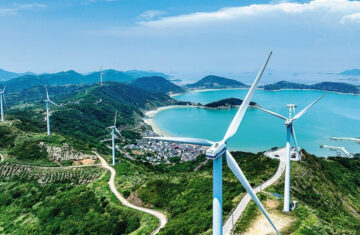Renewable Energy Ambitions in Kazakhstan
Electricity Export Initiatives
Kazakhstan is pushing forward with developing its capacity to export electricity to Uzbekistan and Azerbaijan, despite difficulties in obtaining the electricity required to support the country’s economic expansion.
A draft agreement on the strategic green energy partnership between the government of Kazakhstan and the countries of Azerbaijan and Uzbekistan has been made available for public comment. The deal would add details to a memorandum of intent that the three nations signed in May.
The draft says that in order to improve energy system security and supply stability, “the Parties encourage mutual cooperation in the areas of renewable energy, energy efficiency, green hydrogen, and green ammonia, emphasizing the importance of green and clean energy in global action to combat climate change.”
“Jointly implement new energy infrastructure initiatives that will contribute to the diversification of energy supplies and transit routes in Europe, Central Asia, and the Caspian region” is the commitment made by Kazakhstan in the draft document. Additionally, it states that “rapid, deep, and sustainable reductions in greenhouse gas emissions” are its goals. The parties also state that they are interested in supporting “the interconnection of the energy systems of Azerbaijan and Central Asia for the purpose of broad strategic energy expansion and sustainable export of green energy.”
The European Union, which has struggled with energy shortages and high costs as a result of the disruption caused by the Kremlin’s unprovoked attack on Ukraine and the subsequent imposition of sanctions on Russia, appears to be the primary market for green energy under the trilateral initiative.

Azerbaijan, Kazakhstan, and Uzbekistan intend to build a high-voltage power transmission line on the Caspian seabed in order to enable the export of electricity to the West, as stated in the memorandum of intent that was signed in May. The May memo and the draft agreement from July do not shed light on important details like construction timelines, specific infrastructure projects, and investment costs.
Renewable Energy Potential and Targets
With its wide, windswept steppes, Kazakhstan’s climate and topography make it an ideal place to develop wind power plants. The nation has at least 920 billion kWh of annual wind energy potential, according to the Ministry of Energy.
Kazakhstan is actively utilizing its potential for green energy. Currently, coal-fired production generates approximately 80% of Kazakhstan’s power, with only about 6% coming from renewable sources. However, a bold government plan calls for increasing the proportion of power production from renewable energy to 15% by 2030 and 50% by 2050.
Challenges and Considerations
Some experts wonder where all the power production will come from to meet growing domestic needs and ambitious export goals if the government sticks to those targets. According to Olzhas Baidildinov, a Kazakh energy expert, a Russian media outlet projects that Kazakhstan will have a 6 gigawatt electricity deficit by 2030.
Atomic energy is the wild card in Kazakhstan’s power-generation strategy. Kazakhstan, a nation with the environmental scars to attest to its role as the Kremlin’s primary atomic testing ground during the Soviet era, announced in June that it intended to hold a national referendum on the construction of a nuclear power plant.
Domestic needs could be met by a nuclear plant, leaving production from hydro and wind power sources for export. Polls show that a small majority of Kazakhstanis are in favor of building a nuclear facility despite the damage that the atomic bomb caused to the country’s environment. However, opinions could change based on whatever organization is chosen to construct a plant.
The Russian state-controlled company Rosatom, according to some local observers, has an advantage in winning the contract if the Kazakh government moves forward with its plans to build a plant. However, considering the problematic past of Soviet/Russian nuclear energy, the public’s resistance to the construction of a plant may be stronger for a Russian design than for a facility built in France, South Korea, or even China. The referendum’s date is still pending.



